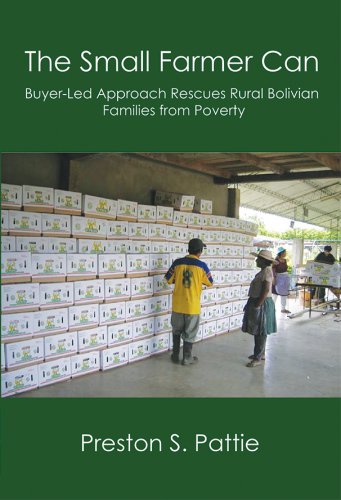
About the Author
Dr. Pattie is a senior agricultural economist with more than 30 years of developing country experience in the formulation and implementation of policies affecting rural development. His skills include analysis of the roles of public and private institutions and the provision of appropriate developmental services. He has been particularly successful in obtaining meaningful participation at all levels, including rural community leaders, private sector and government authorities. He has direct experience in farming and maintains close relationships with many rural families in Bolivia.
After serving in the US Peace Corps in Bolivia, he became an agricultural extension agent in Oregon. Thereafter, most of his career has been dedicated to directing development projects in sustainable forest management, agricultural policy, crop diversification and seed industry development. Country experience includes Nicaragua, Bolivia, Sri Lanka, Honduras, Mozambique, Pakistan, Ecuador and Peru. On the USAID Rural Competitiveness project in Bolivia (RCA), Dr. Pattie developed a novel business approach to transform subsistence farmers into suppliers in formal value chains.
THE SMALL FARMER CAN: Buyer-Led Approach Rescues Rural Bolivian Families from Poverty
Preston S. PattieVellum, 2014
140 Pages, 26 exhibits
ISBN 978-0-9899169-4-3 Paperback
For BULK ORDERS, order directly from New Academia Publishing.
Queries: orders@newacademia.com
About the Author
Dr. Pattie is a senior agricultural economist with more than 30 years of developing country experience in the formulation and implementation of policies affecting rural development. His skills include analysis of the roles of public and private institutions and the provision of appropriate developmental services. He has been particularly successful in obtaining meaningful participation at all levels, including rural community leaders, private sector and government authorities. He has direct experience in farming and maintains close relationships with many rural families in Bolivia.
After serving in the US Peace Corps in Bolivia, he became an agricultural extension agent in Oregon. Thereafter, most of his career has been dedicated to directing development projects in sustainable forest management, agricultural policy, crop diversification and seed industry development. Country experience includes Nicaragua, Bolivia, Sri Lanka, Honduras, Mozambique, Pakistan, Ecuador and Peru. On the USAID Rural Competitiveness project in Bolivia (RCA), Dr. Pattie developed a novel business approach to transform subsistence farmers into suppliers in formal value chains.
About the book
This book tells the story of a successful development project through the eyes of a main participant. The author, Preston Pattie, developed a novel business approach to transform subsistence farmers into suppliers in formal value chains. Through the buyer-led, business approach, the USAID-funded Rural Competitiveness Activity (RCA project) reached 20 thousand Bolivian rural families. Half of these families—ten thousand—have or will overcome poverty in a short time. Rather than emphasizing project assistance, the RCA team facilitated efforts of rural families to carry out their own productive business activities. What appears a subtle difference in focus turned a corner that required the re-engineering of virtually every aspect of project implementation.
The need to reform so many varied aspects of project implementation was not foreseen, and the path to take in each case was not pre-determined. Instead each aspect of the RCA project became an endeavor for reform to solve problems as they were identified or to improve performance toward reaching targets.
Praise
“Pattie has boiled down a lot of complex material very nicely, and his writing style is refreshingly simple, making The Small Farmer Can accessible to a broad range of development professionals.”
― James T. Riordan, author of We Do Know How: A Buyer-Led Approach to Creating Jobs for the Poor.
“The lessons contained in this book were learned not only in the project upon which the book is based, but also throughout a long a distinguished career in development assistance. They are presented in an easy and free of jargon book. All development practitioners, especially highly committed young people entering the field of international development with the intention of making a difference in less privileged people around the world, should read this book.”
― Ivo J. Kraljevic, Director, South America, Chemonics International.
“The Small Farmer Can not only offers a useful case study of a highly effective rural development project, it communicates a deep respect for rural farmers and their families, illuminates the difficulties they face bringing goods to markets and humanizes international development work. Preston’s book was not only an educational and inspiring read; it added a rich and valuable layer of context to my travels in Bolivia.”
― Alexandra Howard, Project Coordinator, City of Portland’s Bureau of Planning and Sustainability.





 Coming Soon
Coming Soon Awards
Awards